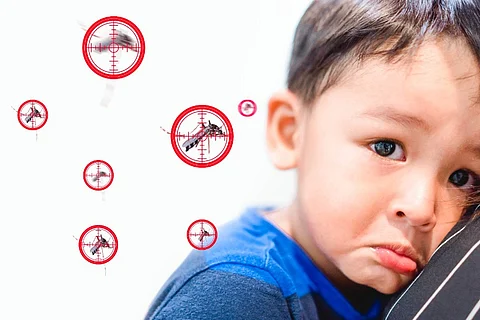

By Dr. Praveen Khilnani
Dengue is a serious systemic viral infection with worldwide distribution. Recent estimates suggest that nearly 3.6 billion people, amounting to almost half the world’s population, live in areas that puts them at risk of contracting the infection.
The highest cases of dengue are reported among children between the ages of 5-15. The disease is endemic in our country, showing its presence seasonally mainly immediately after the monsoon. Spread between humans is by the Aedes aegypti mosquito, therefore it is critical to prevent water collection which aids mosquito breeding, maintain good hygiene, and take extra care during the day as the mosquito is a daytime biter. Keep bare extremities covered or use a mosquito repellent.
In Delhi, 36 new dengue cases were reported in July 2022, while there were 75 cases in August and 152 so far in September, taking the total to 396 this year. Just the last week saw 101 new cases.
The dengue virus is known to have four serotypes: DEN-1, DEN-2, DEN-3 and DEN-4. DEN-2 is the most common in the past 50 years in Delhi and the most severe. A few reported cases of DEN-3 and 4 were found to be similar or no worse. In 2013, a fifth serotype that causes a mild disease was isolated in Malaysia.
Technically a child can be infected five times with the five different serotypes. Infection with one serotype leads to lifelong immunity to that particular serotype; however, contracting a second infection with a different serotype (secondary dengue) runs the risk of severe disease. Children can present with both primary dengue infection (first time with dengue virus) and secondary dengue infection (second dengue virus infection with a different serotype).
Cold extremities after low or no fever after five days of fever
Abdominal pain
Dizziness, especially while walking or getting up from bed
Any bleeding anywhere
Nose bleed
Stool bleed/urine bleed
Bruises
NS1 test positive on day 1-2
IgM test positive on day 5-6
Incubation: 4-10 days after mosquito bite
Symptomatic infections can present with a spectrum of non-specific viral illness to severe dengue infection characterised by severe circulatory shock (fever for 5-6 days followed by cold extremities, bleeding from nose or in stool or blood spots, bruises under the skin, fluid leakage occurs due to injury to blood vessel lining, capillary brain flow reduced in all areas, a rise in fluid in lungs and abdomen, swelling under the skin and puffy eyes. There may be fainting episodes if blood volume goes down and there is concentrated blood due to plasma leaking (high hematocrit PCV that tends to clot and toxins breaks the platelets reducing the number as well as platelet function that are there are not functioning well). All this poor blood flow (meaning poor oxygen delivery) to the liver and kidney causes low urine output, pain in abdomen, deranged LFT (liver function test) and fluid in belly as well as in lungs or outer membrane of lung known as pleural effusion, causing breathing difficulty. There may be pain behind the eyes, dizziness all progressing to multi-organ dysfunction unless fluid intake by oral route or IV if need be is done.
Every year a different serotype may be prevalent. This year, we are witnessing swelling and lowered blood pressure but less bleeding, but serotype is DEN-2. A few years ago, more patients had bleeding warning signs requiring platelet transfusion.
Most dengue cases may be treated at home by fever control and fluid intake to prevent dehydration. Appetite for solids is low in patients, so one should monitor urinary output to know the status of dehydration. Dengue with warning signs and severe dengue with shock, bleeding and multiorgan failure are usual admissions regardless of serotype and can cause death.
Typically the fever gets better on day 5-6, then the leakage starts causing dehydration and low blood pressure, dizziness, abdominal pain, rash and swelling of face, and effusion and abdomen fills with leaked fluid. We must wait until the leak begins to get better. Appetite returns by day 7-8, overall condition improves by day 10. Platelet counts need to be monitored in the patient with any evidence of bleeding. For very young infants, platelets may have be checked early as they can bleed inside the head. It is being observed that post-covid patients have a higher chance of getting severe dengue infection and may get sicker.
Dengue is preventable. In the mosquito breeding season, kids going to school should wear pants if possible or apply mosquito repellent to exposed areas during the day.
This article was published in association with Rainbow Children’s Hospital.